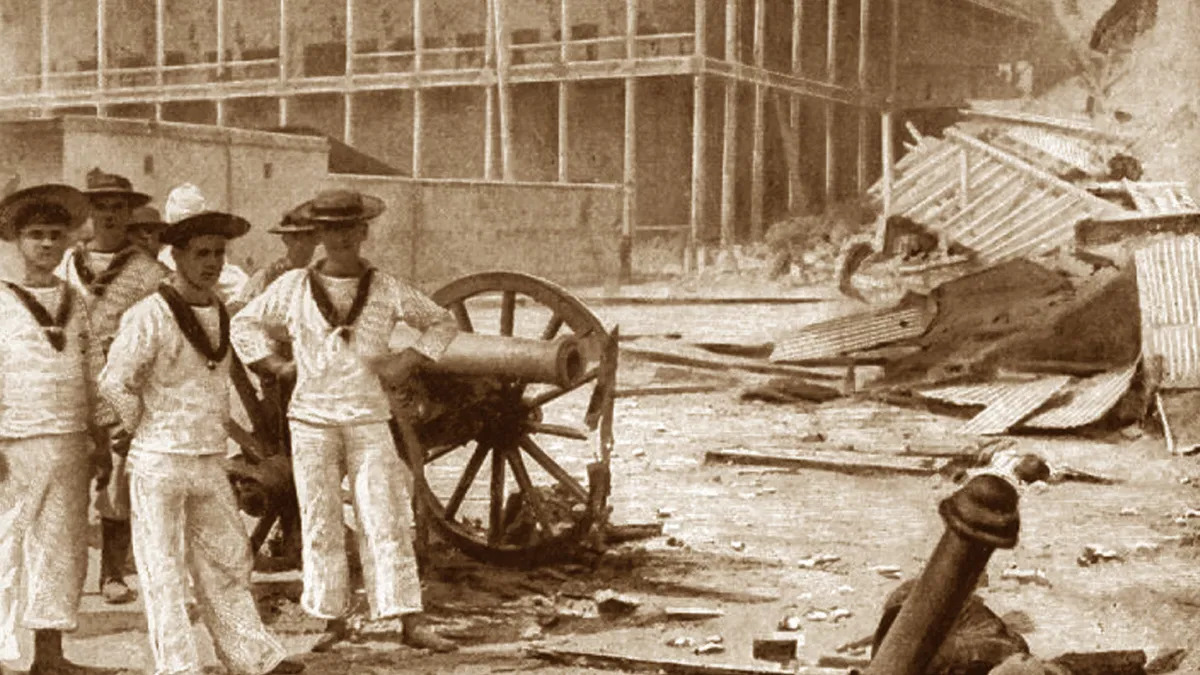
Did you know the Anglo-Zanzibar War is considered the shortest war in history? Lasting only between 38 to 45 minutes on August 27, 1896, this conflict between the United Kingdom and the Zanzibar Sultanate is a fascinating chapter in history. Sparked by the death of the pro-British Sultan and the subsequent succession by someone the British opposed, tensions escalated quickly. Despite its brief duration, the war had significant implications for Zanzibar's sovereignty and its relationship with colonial powers. In this post, we'll uncover 20 intriguing facts about the Anglo-Zanzibar War, shedding light on its causes, the battle itself, and the aftermath. From the war's rapid resolution to the lasting impact on Zanzibar, these facts will provide a comprehensive overview of a unique historical event.
What Sparked the Anglo-Zanzibar War?
The Anglo-Zanzibar War, which erupted on the 27th of August 1896, was primarily sparked by the death of Sultan Hamad bin Thuwaini. Sultan Hamad, who was pro-British, passed away suddenly, and his nephew, Sultan Khalid bin Barghash, seized the opportunity to ascend to the throne without British approval. This act went against an earlier treaty which stipulated that the succession of the sultanate required British consent. Britain, aiming to install a more compliant ruler, Sultan Hamid bin Mohammed, demanded Khalid step down. Khalid's refusal led to the declaration of war.
- Sultan Hamad bin Thuwaini's death led to a succession crisis.
- Sultan Khalid bin Barghash ascended the throne without British consent.
- Britain demanded Khalid's abdication, favoring a ruler they could influence.
The Shortest War in History
Remarkably, the Anglo-Zanzibar War holds the record as the shortest war in history. Lasting between 38 to 45 minutes, the conflict was decisively brief. British forces, equipped with superior military technology and naval power, launched a bombardment against the Sultan's palace and his defending forces. The overwhelming firepower quickly led to Sultan Khalid's forces being outmatched and his eventual flight from the palace.
- Lasted between 38 to 45 minutes, making it the shortest recorded war.
- British forces bombarded the Sultan's palace, showcasing their military superiority.
- Sultan Khalid fled the palace, marking a swift end to the conflict.
Casualties and Consequences
Despite its brevity, the war had significant casualties and consequences. Reports suggest that approximately 500 defenders of the Sultan were killed or wounded, while British casualties were minimal. Following the war, Sultan Khalid sought asylum in the German consulate before being captured and exiled by the British. The British then installed Sultan Hamoud bin Mohammed as the new ruler, who agreed to abolish slavery, a longstanding issue in Zanzibar.
- Approximately 500 defenders were killed or wounded.
- Sultan Khalid was captured and exiled by the British.
- Slavery was abolished in Zanzibar under the new sultanate.
The War's Impact on Colonialism
The Anglo-Zanzibar War underscored the extent of British influence in East Africa and marked a pivotal moment in the history of colonialism in the region. It highlighted the British Empire's readiness to use military force to ensure compliance with its interests and served as a stark reminder of the power imbalance between European colonial powers and their colonies. The war also paved the way for more structured colonial administration in Zanzibar and the broader East African region.
- Highlighted British influence in East Africa.
- Marked a pivotal moment in the history of colonialism.
- Paved the way for structured colonial administration in the region.
Legacy and Remembrance
The Anglo-Zanzibar War, though brief, left a lasting legacy on Zanzibar and serves as a significant historical event in the study of colonialism and military history. It is remembered for its unprecedented brevity and as a clear example of the lengths to which imperial powers would go to secure their interests. Today, the war is commemorated in Zanzibar with various memorials and is an important part of the island's rich historical tapestry.
- Left a lasting legacy on Zanzibar and colonial studies.
- Commemorated with memorials in Zanzibar.
- Serves as a significant event in military history.
The War's Influence on International Relations
The aftermath of the Anglo-Zanzibar War had implications for international relations, particularly between Britain and Germany. At the time, Germany held territories in mainland East Africa and had interests in the region. The swift resolution of the conflict and the installation of a pro-British sultan in Zanzibar demonstrated Britain's dominance but also necessitated diplomatic negotiations to maintain balance in the region. This event subtly influenced the carving up of Africa and the dynamics of colonial competition.
- Influenced Britain-Germany relations in East Africa.
- Demonstrated Britain's dominance in the region.
- Necessitated diplomatic negotiations to maintain regional balance.
Technological Advancements and Warfare
The war also showcased the role of technological advancements in warfare. The British naval forces used modern gunboats, cannons, and rifles, which were far superior to the Sultan's arsenal. This disparity in military technology was a decisive factor in the quick resolution of the conflict. The Anglo-Zanzibar War exemplifies how technological superiority can be leveraged in military engagements to achieve swift victories.
- Showcased the role of technological advancements in warfare.
- Technological superiority led to a swift victory for the British.
A Glimpse into History's Briefest Conflict
Reflecting on the Anglo-Zanzibar War, it's clear this event, though fleeting, left an indelible mark on history. Lasting a mere 38 minutes, this war stands as the shortest recorded military engagement, showcasing the might of the British Empire and altering the course of Zanzibar's history. The conflict underscored the tensions between colonial powers and their territories, highlighting the complexities of sovereignty, resistance, and the rush for control in Africa. Through this brief encounter, we gain insights into the broader implications of colonialism, the triggers of conflict, and the lasting impacts on nations and their peoples. As history moves forward, remembering events like the Anglo-Zanzibar War helps us understand the intricate tapestry of global relations and the delicate balance of power that shapes our world.
Was this page helpful?
Our commitment to delivering trustworthy and engaging content is at the heart of what we do. Each fact on our site is contributed by real users like you, bringing a wealth of diverse insights and information. To ensure the highest standards of accuracy and reliability, our dedicated editors meticulously review each submission. This process guarantees that the facts we share are not only fascinating but also credible. Trust in our commitment to quality and authenticity as you explore and learn with us.


